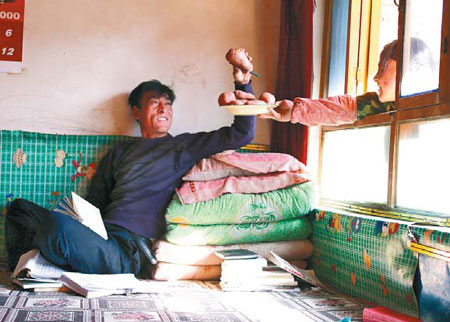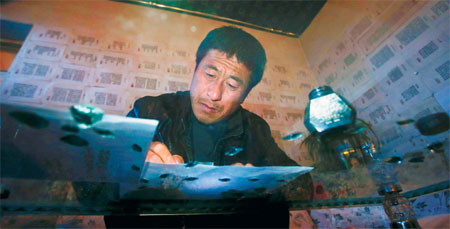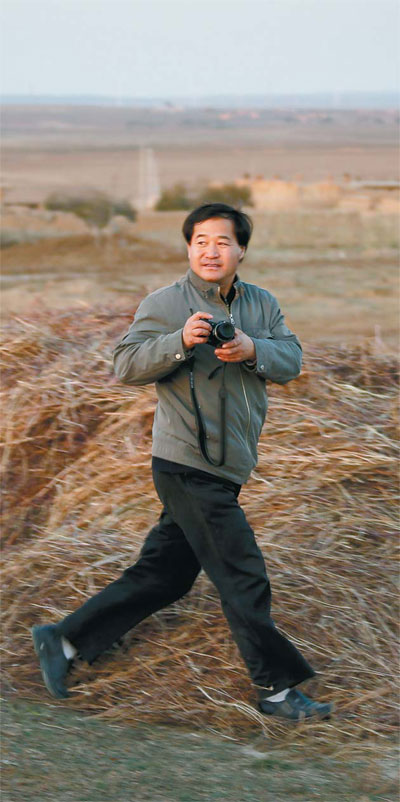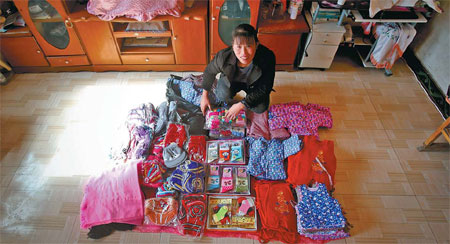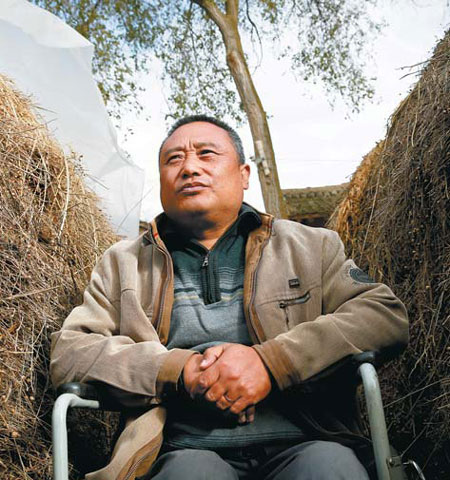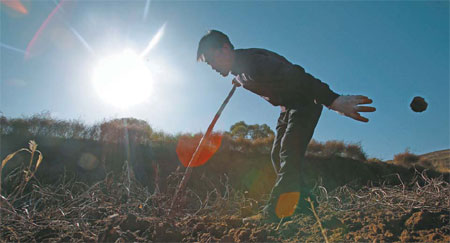Farmers harvest a crop of poetry
Updated: 2012-11-06 08:16
By Peng Yining (China Daily)
|
||||||||

|
For rural poet Kang Pengfei, baked potatoes provide food for thought. Kuang Linhua / China Daily |
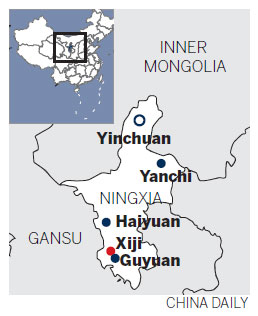
Editor's note: This is the third in a regular series of reports brought together under the banner "Lost Horizons", which aims to show life in the less-reported areas of the country and to give a voice to those whose words oft en go unheard. Slideshows and video footage are also available at www.chinadaily.com.cn/video
Words help provide a refuge from harsh rural reality, Peng Yining reports in Xiji, Ningxia.
For 30 years, potato farmer Zhang Lian plowed his fields during the day and wrote poetry at night. In the harsh environment of Northwest China's Ningxia Hui autonomous region, writing was his only hope and provided a source of spiritual solace, said the 45-year-old.
In 2001 a severe drought devastated Zhang's 60 mu (4 hectares) of potatoes and sunflowers, the crops best suited to Xiji's infertile soil and the only source of income for the family.
On Chinese New Year's Eve 2001, Zhang tried to sell an old sheepskin, the last item of value he owned, to buy a pack of hard candy he had promised his 7-year-old son. He failed.
Feeling desperate in the icy winter wind, Zhang walked slowly back to his mud-brick home, 20 km from the street market.
Firecrackers exploded on the dusty, rural streets, decorated with red lanterns and the village was full of people rushing home to spend the most important holiday of the year with their families.
Zhang was unable to share the excitement. "I didn't even know where the next meal would come from," he said. "I came home with nothing but the unsold sheepskin."
That evening Zhang, who dropped out of middle school because his parents couldn't afford to keep him there, took out his diary and began writing the first draft of a poem:
I walk
With my skin in my hand
Owning not even a penny
Only my skin
In my hand ...
"I was so desperate, embarrassed and humiliated that I felt I was walking with my skin peeled off and all my flesh exposed," he said. "It wasn't just the sheepskin I was referring to in my diary," he said.
Since middle school, Zhang has written more than 1,000 poems, scribbled in used textbooks and the margins of newspapers and old magazines.
At first, writing was just a hobby. Later it became his livelihood.
Planting potatoes earned Zhang about 3,000 yuan ($480) a year. In 2000, he obtained a loan of 2,000 yuan from friends and printed 400 copies of his first collection of poems, Nightfall, and tried to sell them door to door.
"Hello. My name is Zhang Lian. I am a poet. Would you like to buy my book?" he asked, when knocking on strangers' doors during the slow season. He priced his book at seven yuan and sold 350 copies.
In 2008, he joined Ningxia's Writers Association and became a full-time writer. This year Zhang was chosen as one of the "Ten Best Rural Poets" by the Chinese Writers Association and published his eighth collection. He can earn around 30,000 yuan per annum from doorstep sales, enough to allow his family to move from their village to the local town.
A large number of impoverished writers live in this poverty-stricken province, including accomplished poets, novelists and winners of national awards. In south Ningxia's mountainous region, which the United Nations identified as one of the most uninhabitable zones in the world in the 1970s, these potato-planting literati struggle to feed their families but maintain their faith in writing. For them, literature is not just a spiritual quest, it may also lead to a better life.
Last year, Xiji, one of the poorest counties in the region, was designated "The Hometown of Literature in China" by the Chinese Writers Association and the China Literature Foundation, because of the popularity of literature in general and the many high-caliber works by local authors.
Their work is called Xihaigu Literature, a portmanteau derived from the names of some of the poorest southern counties, including Xiji, Haiyuan and Guyuan. It is a crucible of rural Chinese literature, acknowledged by the recent Nobel Prize awarded to one of its most representative writers, Mo Yan.
Solemn emptiness
Conditions in Ningxia can be brutal: The rugged mountain ravines, dry riverbeds, and solemn emptiness of the sandy plateaus often appear in Xihaigu Literature. Poverty and hunger are common topics as the writers describe their rural lives and culture.
"I used to complain about living in such a poor area and in a poor family," said Guo Wenbin, a 46-year-old writer who was born and raised in Xiji. "I often asked 'Why me'?"
He admitted that after years of eating potatoes and sorghum flour, the greatest luxury he could envisage as a young man was eating an apple, but that rarely happened.
"However, I wouldn't be able to write so many stories without those experiences," said Guo, who is deputy director of Ningxia's Writers Association. In 2007, he won one of the country's top literary awards, the Lu Xun Literary Prize, named after one of China's most renowned authors, with a short story chronicling the lives of two children in a remote village.
"Life experience makes for good stories, and in return, literature and writing change people's lives," he said.
Kang Pengfei's life changed when he was deeply touched by a novel he stole from a bookstall
"A person will be enlightened at some time in his life. How early that enlightenment occurs decides the person's fate," according to a character in Lu Yao's award-winning novel Ordinary World.
Kang said the sentiments stirred his soul.
At 17, he fled his village and joined the local gangsters. At one point, he robbed a couple in town, taking 85 yuan, all the money they had. "The wife knelt and begged me not to take their money, saying they had worked a whole week to get it, but I didn't listen," he said. "This has become a source of great anxiety to me."
Kang, 35, whose parents are illiterate, dropped out of school when he was 15: "Nobody told me right from wrong or how to behave," he said. "I felt confused and guilty as I grew older, but I didn't have the courage to make a change."
The writer from Xiji county said farming the arid, sandy soil is a gamble because irrigation depends on rainwater. If the rains failed to arrive, a whole year's backbreaking work would be in vain.
Potatoes form part of every meal, every day, washed down with boiled rainwater collected in a cistern, he said. Kang didn't see a future in planting potatoes, something his ancestors did for their entire lives.
"I cried reading that novel, and it convinced me to be a good person," he said. When he tried to return the book to the stall, the bookseller forgave him and gave him another book as a gift. "Read, and the power of literature will help you," the elderly man told Kang.
When he returned home, Kang started to keep a diary. He published his first poem, in a local literary journal in 1998. In 2003, his novella Night Bus won a national award.
He said writing wasn't easy for a farmer who hadn't even finished middle school, but he picked up his old textbooks and taught himself the long-forgotten characters. He wrote for a couple of hours every day, sometimes staying up all night and then going straight to his potato field.
In October, the morning temperature in Xiji drops below freezing. In the snow and low cloud shrouding the mountains behind his field, Kang and his wife were digging up potatoes. With enough rain, the 30 mu of potatoes would bring in more than 30,000 yuan, he said.
As he worked, he unearthed fresh potatoes, their red skins caked with mud. The workers built a small fire in the field and baked a potato for lunch. Soon they all were sweating, despite the cold. Kang removed his jacket and rolled up his sleeves. A fading butterfly tattoo, a symbol of his earlier gangster life, was clearly visible on his lower right arm.
"I admired a movie character nicknamed Butterfly, a petty criminal and a thief," he explained. "But now I want to get rid of the tattoo. I don't even wear T-shirts in summer."
Kang said he tried to persuade his "brothers" in the gang to live a normal life. "But they laughed at me, saying I had been brainwashed by a novel, and only dorks read books," he said. "One of them was recently sentenced to 13 years in prison for robbery.
"It could be me in that prison. Without literature, I wouldn't have discovered my life's purpose until it was too late," he said. "Writing doesn't bring me a fortune, but it does make me believe that a farmer can live a hopeful life."
Culture and tradition
Xiji has a population of 510,000, but there are 37 literature clubs and more than 200 published writers, including six members of the Chinese Writers Association and 31 from the provincial association, according to Guo Ning, director of Xiji's Literature and Art Association. As editor-in-chief of the biggest local literary magazine, Guo said he has received more than 25,000 e-mails from aspiring contributors during the past three years.
"Reading and writing is our culture and tradition," said Guo, "People also forge close links through literature."
Wang Xueyi, a 52-year-old who has been paralyzed since a scaffolding accident when he was 19, said he got his social life back through writing.
After the accident, he was bed-ridden for several years. Reading and writing became one of few things he could do. In 1987, he published his first story and made 40 yuan.
When an editor called him for more stories, he felt he was useful for the first time in his life.
"Without reading my stories, who would know about a paralyzed person like me?" he said. "When I was first visited by other lovers of literature in my town, I felt like an antique that had finally been excavated after centuries.
"Most of the visitors were also farmers. We talked about our crops, cattle, and, of course, literature," he said.
Yang Xiuqin writes for rural women like herself. Her short novels, mostly romances, are popular with a lot of female readers in Xiji.
"In the rural areas, women are not even supposed to go to school, but I want to prove that women should have decent education and can be writers," said the 40-year-old woman.
Her success has encouraged her daughters, 18 and 16, to stay in school, although her husband complains that writing keeps Yang from doing farm work but doesn't bring in more income for the poor family.
"Misunderstanding and disdain are common events for rural writers," said Ma Jianguo, a 43-year-old farmer and construction worker, and the only poet in his village.
The walls of his living room are covered with his work, mainly classical-style Chinese poetry and aphorisms, written on white paper and marked with his seal.
He has displayed his poems at a May street market in his village every year since 2007. He pastes the papers containing his work on a 2-sq-m piece of hardboard and writes four large characters at the top: Shi Ci Jiao Liu, or Poetry and Phrase Workshop.
"I have no one to talk to about writing. I am so lonely and anxious that I beg for comments, whether they are good or not," he said. "Only a few people stopped by my poetry sign. Most thought I was ridiculous, and some said I was crazy. They asked, 'Why didn't you bake a potato if you had enough time on your hands to write that nonsense?'"
Although he lives in the deserted inland and rarely leaves his village, Ma's work is mostly about life and the fertile environment around Jiangnan, an area on the lower reaches of Yangtze River.
"It needs imagination," he said. "When I look far into the distance, I always imagine that beyond the yellow hills there are rivers, lakes, trees and flowers, just like the place I have always wanted to live."
In the dusky light, Ma curled up by the stove, and his calloused hands opened a notebook on a low table.
"The clear stream holds a lonely boat," he wrote, while the night wind whistled outside and the snow beat against the window.
"Flowers are falling like snow ...,"he continued. The glow from the fire cast his shadow on the walls.
"In poverty-stricken areas, literature can be a strong spiritual force and helps people to survive. Besides, there aren't many other pastimes, so writing is likely to be popular there," said Su Bingpeng, senior editor of Yellow River Literature, a major publication in Ningxia. "But it's hard to make money by writing."
Writers are paid around 30 yuan per 1,000 words, but the rate is falling as the magazine's circulation declines.
"Even it doesn't make money, I still love writing," said Zhang Lian, the poet. "I believe people have the right to enjoy the beauties of nature and literature, even without money or education."
Writing is an impulse deep inside a person's instincts, he said. When he had acute hepatitis at age 10, Zhang's father dragged him 20 km to the hospital on a wooden litter. They were moving along a bumpy country road, which cut through flat, desolate ground, when a gust of wind woke the sick boy with the dust it stirred. At first, he saw the pink-tinged sky on the horizon and then the setting sun reddening the heavens.
"It was sad, but magnificently beautiful," he said. "I had tears in my eyes. That was the moment I knew I wanted to write."
He later recast the scene in the poem This Is Where the World Pulls Down the Curtain.
"You can curse, or escape, when life corners you," he said. "Or, you can write a poem."
Contact the reporter at pengyining@chinadaily.com.cn
|
Ma Jianguo, a 43-year-old farmer and construction worker, is the only poet in his village in Xiji county, in Ningxia Hui autonomous region. |
|
Zhang Lian, 45, a farmer during the day and a poet at night. Photos by Kuang Linhua / China Daily |
|
Yang Xiuqin, 40, writes short novels, mostly romances, when she finishes work at her cloth business every day. |
|
Wang Xueyi, 52, who has been paralyzed for many years, published his first story in 1987. His home is often a gathering place for lovers of literature. |
|
Kang Pengfei, 35, plowing his potato field, changed his life by reading and writing novels. |
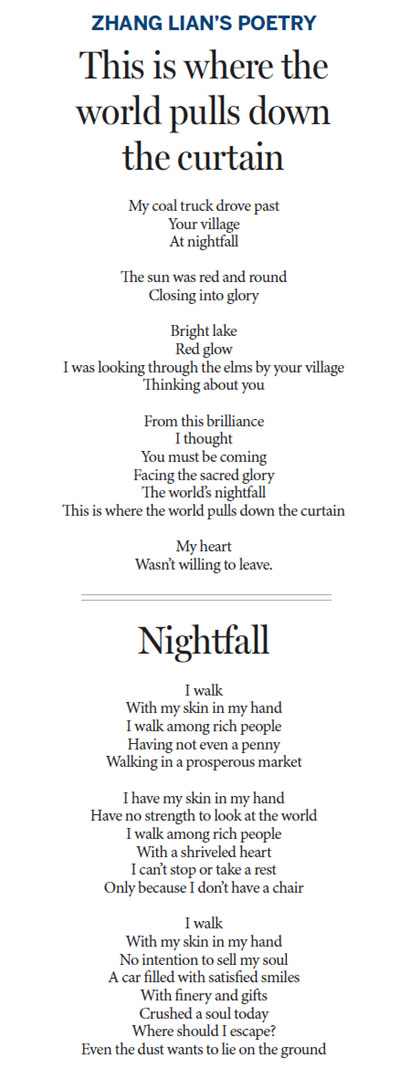
(China Daily 11/06/2012 page6)

 Relief reaches isolated village
Relief reaches isolated village
 Rainfall poses new threats to quake-hit region
Rainfall poses new threats to quake-hit region
 Funerals begin for Boston bombing victims
Funerals begin for Boston bombing victims
 Quake takeaway from China's Air Force
Quake takeaway from China's Air Force
 Obama celebrates young inventors at science fair
Obama celebrates young inventors at science fair
 Earth Day marked around the world
Earth Day marked around the world
 Volunteer team helping students find sense of normalcy
Volunteer team helping students find sense of normalcy
 Ethnic groups quick to join rescue efforts
Ethnic groups quick to join rescue efforts
Most Viewed
Editor's Picks

|

|

|

|

|

|
Today's Top News
Health new priority for quake zone
Xi meets US top military officer
Japan's boats driven out of Diaoyu
China mulls online shopping legislation
Bird flu death toll rises to 22
Putin appoints new ambassador to China
Japanese ships blocked from Diaoyu Islands
Inspired by Guan, more Chinese pick up golf
US Weekly

|

|
